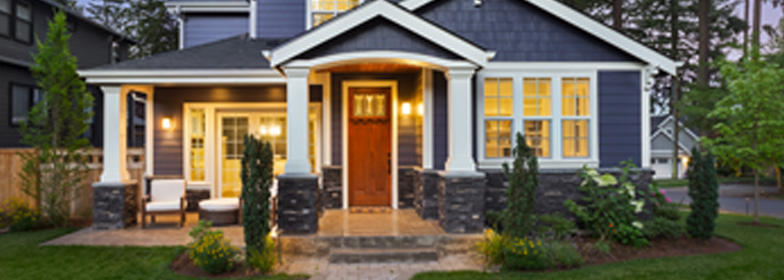
Weird but true: 16 fascinating facts about houses
Whether you need an icebreaker for your next dinner party or just want to entertain your brain during your coffee break: These fun facts might surprise you.
16 fun facts you (probably) never knew about houses
We spend years of our lives at home. How many fun facts do you know about them?
-
Sears used to sell mail-order houses
Available by catalog order from 1908 to 1940, Sears Modern Homes took DIY to a whole new level. As many as 75,000 home kits were sold in hundreds of different styles, some are still in existence.
-
A creaking house is related to temperature—not age
When it comes to houses, creaking and groaning aren’t necessarily signs of old age. House noises are usually caused by fluctuating humidity and temperature (also called thermal expansion and contraction).
-
Homes with black front doors sell for the highest price
A black front door is usually associated with the highest asking price, a Zillow survey noted. A home with a black front door might sell for up to $6,449 more, while a slate blue front door comes in close second.
-
Off-white houses are the most popular
Recently surveyed homeowners said lighter colors are better for a home’s exterior. A 2023 Alside poll found that off-white/cream is the preferred siding color, followed by light gray, white, and light brown.
-
Brass doorknobs can disinfect themselves
The reason many doorknobs are made of brass is because of something known as the oligodynamic effect. Unvarnished brass objects can self-disinfect, proving especially useful on frequently touched surfaces.
-
The typical homeowner stays in their house for 13.2 years
The number of years the typical homeowner in the U.S. spends in their house is 13.2 years. Homeowner tenure has risen from 10.1 years in 2012 and dropped from its highest recorded point of 13.5 years in 2020.
-
A seller must disclose if a house is haunted
A 1991 Supreme Court decision—also referred to as the “Ghostbusters ruling” —helped drastically decrease the odds of accidentally buying a haunted house. Lack of disclosure could result in contract rescission.
-
A castle in France may cost less than a teardown in Los Angeles
You could become the proud owner of an 18th century French castle for a little over $1 million. For the same amount, you might not get much more than a home in need of an overhaul in L.A., depending on the market.
-
Property tax started in ancient times
It’s one of life’s not-so-fun facts: Taxation has always been a part of civilization. As for property taxes, there’s no one person to blame. Land taxes can be traced as far back as 5,000 B.C. in ancient Egypt.
-
The world’s biggest house is 400,000 square feet.
The biggest house in the world is owned by Mukesh Ambani and located in Antilia in Mumbai, India, according to the Guinness Book of World Records. It has 27 stories, multiple swimming pools, and 168 parking spaces.
-
The world’s smallest house is 25 square feet
The smallest house in the world manages to fit a sink, stove, and shower within its miniscule square footage. The tiny house, created by Glen Bunsen, is transportable and can fit inside a van.
-
The most homes sold in one year is 6,438
The record for selling the most homes in one year goes to Ben Caballero, a real estate agent in Dallas, Texas. Caballero sold more than 6,000 homes throughout 2020.
-
Homes are roughly 30 percent larger than they used to be
Census data shows that the median size for a single-family home is 2,299 square feet. A median-sized home built before or during the 1960s measured at around 1,500 square feet.
-
Mark Zuckerburg bought four houses surrounding his house
Why would Facebook co-founder Mark Zuckerberg spend over $40 million to buy the four homes bordering his primary Palo Alto residence? Reportedly, for privacy—with the intention of creating his own compound.
-
The first real estate agents were called “curbstoners”
A curbstoner typically refers to an unlicensed dealer, and in the early 1900s, this included real estate agents. At that time, curbstoners were said to be unregulated house flippers, hoping to quickly sell a property for cash.
-
Homeowners used to burn their mortgage documents after paying off their house
While Scottish homeowners might paint their front door red after making their last mortgage payment, early 20th century homeowners may have had a mortgage burning party instead.
We can help you take the next step
Whether it’s buying or building your first home, selling and buying a new home, refinancing your mortgage, or making home upgrades, we’re here to walk you through it. If you have questions, we can help you find answers. Contact your local loan officer for guidance.
The above information is for educational purposes only. All information, loan programs and interest rates are subject to change without notice. All loans subject to underwriter approval. Terms and conditions apply. Always consult an accountant or tax advisor for full eligibility requirements on tax deduction.
